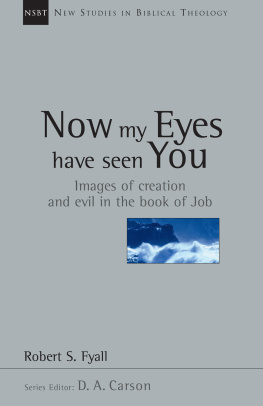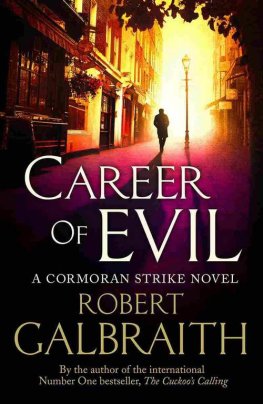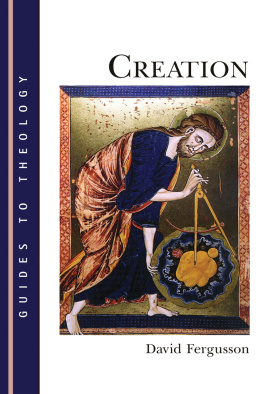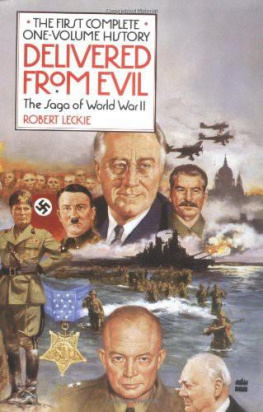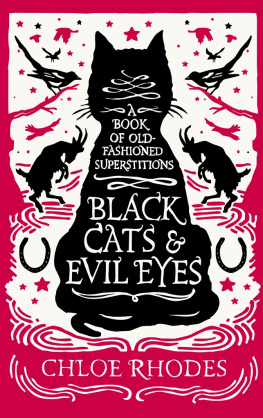Sommaire
Pagination de ldition papier
Guide
Titles in this series:
1 Possessed by God, David Peterson
2 Gods Unfaithful Wife, Raymond C. Ortlund, Jr
3 Jesus and the Logic of History, Paul W. Barnett
4 Hear, My Son, Daniel J. Estes
5 Original Sin, Henri Blocher
6 Now Choose Life, J. Gary Millar
7 Neither Poverty Nor Riches, Craig L. Blomberg
8 Slave of Christ, Murray J. Harris
9 Christ, our Righteousness, Mark A. Seifrid
10 Five Festal Garments, Barry G. Webb
11 Salvation to the Ends of the Earth, Andreas J. Kstenberger and Peter T. OBrien
12 Now My Eyes Have Seen You, Robert S. Fyall
NEW STUDIES IN BIBLICAL THEOLOGY 21
Series editor: D. A. Carson
Now My Eyes
Have Seen You
IMAGES OF CREATION AND EVIL
IN THE BOOK OF JOB
Robert S. Fyall
InterVarsity Press
P.O. Box 1400, Downers Grove, IL 60515-1426
World Wide Web: www.ivpress.com
E-mail:
Robert S. Fyall 2002
All rights reserved. No part of this publication may be reproduced, stored in a retrieval system or transmitted in any form or by any means, electronic, mechanical, photocopying, recording or otherwise, without the prior permission of InterVarsity Press.
InterVarsity Press is the book-publishing division of InterVarsity Christian Fellowship/USA, a student movement active on campus at hundreds of universities, colleges and schools of nursing in the United States of America, and a member movement of the International Fellowship of Evangelical Students. For information about local and regional activities, write Public Relations Dept., InterVarsity Christian Fellowship/USA, 6400 Schroeder Rd., P.O. Box 7895, Madison, WI 53707-7895, or visit the IVCF website at .
All Scripture quotations, unless otherwise indicated, are taken from the New American Standard Bible, copyright 1960, 1962, 1963, 1968, 1971, 1972, 1973, 1975, 1977, 1995 by The Lockman Foundation. Used by permission.
ISBN 978-0-8308-7141-4 (digital)
ISBN 978-0-8308-2612-4 (print)
This digital document has been produced by Nord Compo.
To Thelma,
with love and gratitude
Series preface
New Studies in Biblical Theology is a series of monographs that address key issues in the discipline of biblical theology. Contributions to the series focus on one or more of three areas: 1. the nature and status of biblical theology, including its relations with other disciplines (e.g. historical theology, exegesis, systematic theology, historical criticism, narrative theology); 2. the articulation and exposition of the structure of thought of a particular biblical writer or corpus; and 3. the delineation of a biblical theme across all or part of the biblical corpora.
Above all, these monographs are creative attempts to help thinking Christians understand their Bibles better. The series aims simultaneously to instruct and to edify, to interact with the current literature, and to point the way ahead. In Gods universe, mind and heart should not be divorced: in this series we will try not to separate what God has joined together. While the notes interact with the best of the scholarly literature, the text is uncluttered with untransliterated Greek and Hebrew, and tries to avoid too much technical jargon. The volumes are written within the framework of confessional evangelicalism, but there is always an attempt at thoughtful engagement with the sweep of the relevant literature.
For many readers, Job has been a closed book, or, at most, a book with which they have only a superficial acquaintance. They know it is about suffering, and not just any suffering but unjust suffering. They may even recall that such suffering is Jobs lot, that God has permitted Satan to have a relatively free hand with the unfortunate man, and that Job begins by taking it very well, but over the course of several cycles of debates between Job and his miserable comforters he becomes more and more convinced of his own righteousness and of the unfairness of what he is experiencing. Eventually, in several highly symbol-laden chapters, God scolds Job but does not give him a direct answer to his most burning questions. Then the book closes with a happy ending. This, more or less, is what casual readers know of the book of Job.
What are we to make of this? In fact, we do not begin to gain a real grasp of the message of the book of Job and of its contribution to the canon, apart from a more detailed grasp of its imagery and drama. Here Dr Fyall is a sure-footed guide: not only does he lecture in Old Testament, but he preaches regularly in a church that draws several hundred university students something that does not usually happen unless the preacher has something to say from the Bible, and says it well. In this book many more can listen in with pleasure and profit.
D. A. Carson
Trinity Evangelical Divinity School
Authors preface
How long does it take to write a book? This work is a substantial rewriting of my doctoral thesis presented to the University of Edinburgh in 1991. Its roots, however, go further back to my undergraduate studies and beyond that to my late teens when I read the book of Job (in the AV) at a time when I was also devouring other works such as John Miltons Paradise Lost, the plays of Shakespeare and Homers Iliad. In the study of Job my great loves of theology, of Bible exposition and literature came together especially powerfully and significantly.
Job studies have not stood still in the ten years since the thesis was presented, and this book differs in many ways from the original study. However, the basic argument at the heart of it is still the same: that the key to Job is its depiction of God dealing with and overcoming evil, represented by Behemoth and Leviathan. Over the last decade I have taught the book at St Johns College, Durham and I am grateful to the many students who have sharpened my insights and raised new ideas and suggested new angles on the text. Many of them have urged me to see this into print, and encouraged me to return to this project three years ago when the serious writing began. I am also grateful to the 1992 executive of Durham Christian Union who asked me to give a series of talks on Job. These talks, somewhat expanded, were published by Christian Focus Publications in 1995 under the title How does God treat his friends? Marianne Young, former Course Administrator at St Johns College, has transferred the whole thing on to computer disk and has my most grateful thanks.
To my former teacher and supervisor of the thesis, Professor John Gibson, who was also my mentor in matters Ugaritic, I give my grateful thanks. Also, thanks are due to Professor Emeritus Robert Davidson, the external examiner of the thesis and Dr Peter Hayman, the internal examiner. Both have my gratitude for their courtesy and shrewd comments.
It is a great joy to have this book published as part of the New Studies in Biblical Theology. No-one could have been more helpful, encouraging and supportive than Professor D. A. Carson. His own immense knowledge and love of Scripture, and his concern for accuracy as well as the broad sweep of the argument, have constantly urged me on with this project. I also thank Inter-Varsity Press, and particularly Dr Philip Duce, for their courteous help. My hope and prayer is that this book will send people back with renewed interest to the book of Job and indeed to the Bible as a whole.

